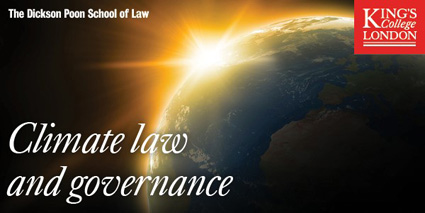Climate Law and Governance at King's hosts its Inaugural Lecture

Time and Environmental Law in a Changing Climate
The Dickson Poon School of Law hosted its inaugural Climate Law & Governance Lecture on 1 February 2017, presented by Professor Benjamin J. Richardson on the topic Time and Environmental Law in a Changing Climate. Professor Benjamin J. Richardson is Professor of Environmental Law at the University of Tasmania and also Global Law Visiting Chair at the University of Tilburg and Visiting Professor at The Dickson Poon School of Law in 2017. His talk was based upon his forthcoming book, Time and Environmental Law (Cambridge University Press).
Introducing the series, Acting Executive Dean Professor Ben Bowling acknowledged the School as a key reference point in the growing area of climate law.
Dr Eloise Scotford, co-leader with Dr Megan Bowman of Climate Law and Governance at King's, further explained that the growth in research, teaching, and engagement activity in this field was a sign of the times socially, and also for King's College London, which is home to a breadth of research and educational activity in response to our changing climate.
In his lecture, Professor Richardson considered how time is fundamental to human affairs. Since humans began having a significant impact upon the earth, the discrepancy between human and natural timescales has grown ever more pronounced. Disciplined by industrial clock time, modern life distances people from nature’s biorhythms such as its ecological, evolutionary, and climatic processes.
He went on to explain how the law is complicit in perpetuating this discrepancy in timescales - through fast-track legislation and unsustainable time frames of resource exploitation and impacts including carbon emissions. He also described how the law ‘grandfathered’ existing activities, limiting responsiveness to changing circumstances and how indifference to past ecological damage and neglect of its restoration can be an equally serious flaw.
The lecture concluded with an exploration of how law can align with the ecological ‘timescape’ and enable humankind to ‘tell nature’s time’. Minding nature, not the clock, requires regenerating Earth and restoring its ecological integrity, adapting to its changes, and often living or at least making decisions more slowly.
Throughout his talk, Professor Richardson cited visual artists whose work seeks to engage people with the concept of time and their relationship with the natural world.
The discussant for the lecture was Cormac Cullinan, author of the groundbreaking work on earth jurisprudence Wild Law: A Manifesto for Earth Justice and founder of Cullinan & Associates (Cape Town, South Africa). In his response, Mr Cullinan spoke of the importance of Ben’s work in bringing to prominence the need to reconnect human affairs with the rhythms of the planet by resetting our own timescales to work in closer alignment with the natural world. He highlighted the importance of ‘timing’ as an adjunct to ‘time’, which includes systemic relationships and legal decision-making as actions that affect and interact with the natural world.
Climate Law and Governance at King's is concerned with investigating and evaluating legal and governance frameworks for climate change policy across different countries, across different sectors and cultures. Current research in the School is examining governance modalities for the mobilization of climate finance and technology, how climate change is adjudicated in the courtroom and how it can disrupt dominant legal and decision-making frameworks.
Find out more about Climate Law and Governance at King's